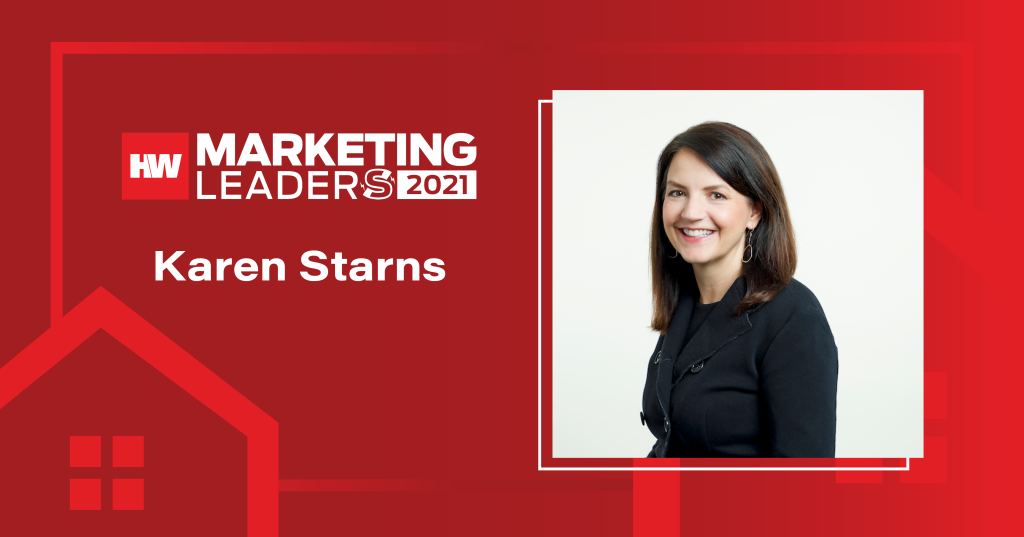The HousingWire award spotlight series highlights the individuals who have been recognized through our Editors’ Choice Awards. Nominations for HousingWire’s Marketing Leaders award are now open through Friday, March 25, 2022. Click here to nominate someone you know — it can even be you!
Consumer habits and expectations shifted dramatically as the pandemic took hold two years ago, affecting the way every industry approaches its customer experience. This has been particularly true in real estate, as Americans have not only grown accustomed to having access to information with the click of a button but also as the idea of “home” suddenly held a much higher value than it did before.
Companies like OJO Labs are working to tap into these changing patterns to better understand the “must-haves” and “nice-to-haves” of consumers and to help deliver a low-friction matching to quality providers, according to Karen Starns, chief marketing officer at OJO.
“Our offerings and our storytelling can tap into this rich vein of trends and connect with people on a substantive level,” said Starns. “As real estate marketplaces like OJO bring millions of consumers to a wide range of providers through technology and expert guidance, more people will find success buying, owning or selling a home.”
Starns was honored as a 2021 Marketing Leader, one of HousingWire’s newest awards that recognizes the best-of-best marketing execs in housing. Starns was honored for her work establishing OJO Labs as a go-to resource for all aspiring homebuyers no matter their race, class, or gender, in the midst of massive growth within the organization.
HousingWire reached out to Starns to hear more about the latest tech trends in real estate and insights into the home journey of consumers.
HousingWire: What are the real estate tech trends that you’re closely watching and/or where is real estate tech innovation headed?
Karen Starns: Uber and Airbnb are two companies that offer insights into the value and deep personalization that only a marketplace can provide — understanding the must-haves and nice-to-haves of ready consumers and delivering low-friction matching to quality providers. I fundamentally believe that your last best consumer experience sets the bar for all your consumer experiences.
As real estate marketplaces like OJO bring millions of consumers to a wide range of providers through technology and expert guidance, more people will find success buying, owning or selling a home. We should continually assess how tech is improving our consumer experience outside of real estate and use it as an input into our own innovation and understanding of changing consumer expectations. As for me? I need a dog-friendly ride to work — check! I want a vacation place within walking distance of restaurants, a well-stocked kitchen, access to the homeowner for questions and a curated checklist of neighborhood favorites. Oh, and a heated pool — check! While homebuying or owning or selling will never be as simple as booking your next vacation, there are experiences that can serve to inspire how our marketplaces evolve.
HW: What consumer insights have surprised or intrigued you the most since the pandemic?
Karen Starns: According to Harris Poll, two years into COVID, 45% of Americans say they are still wary of in-person events, and 53% currently would rather attend a virtual event. However, the attendee experience at virtual events often falls flat – with 52% feeling isolated at remote events. These insights on Harris Poll’s report on the current state of the entertainment industry provide some useful fodder for us in real estate.
There’s a great point here about finding the balance for real estate. A virtual meet and greet with your newly matched agent may be both efficient and effective for everyone involved. Experiences like virtual tours and 3D tours may help shape a shortlist and knock out options. There’s still a crucial part of real estate that needs to be done in person, but the days of packed open houses might well be behind us as a new balance of virtual and in-person touchpoints take hold.
HW: In the marketing and tech world, data is often top of mind. What consumer data or data trends are you following for 2022?
Karen Starns: Ikea has done a lot of research on wellbeing, and their insights into nesting, comfort, control is instructive in how we engage with people on their home journey — whether buying, owning, or selling. Home as a happy place; home as a safe harbor — these are ideas that have taken hold with consumers. From Ikea:
- 40% who felt more positive towards their home also saw a positive impact on their mental health
- 93% think it is important that their home provides them with a sense of comfort
- 73% say they have spent more time in their neighborhoods in the last 12 months
These insights and others including DIY trends and soaring revenues at Home Depot provide powerful emotional fodder for real estate industry marketers focused on authentically connecting with consumers. There’s a connection between home and the health of a community both mentally and physically. When we talk about the mental benefits, the numbers above are a perfect illustration. Then there’s also the physical aspect — access to green space, healthy food, clean air, etc. Where are people moving? What communities are growing? Our offerings and our storytelling can tap into this rich vein of trends and connect with people on a substantive level.




